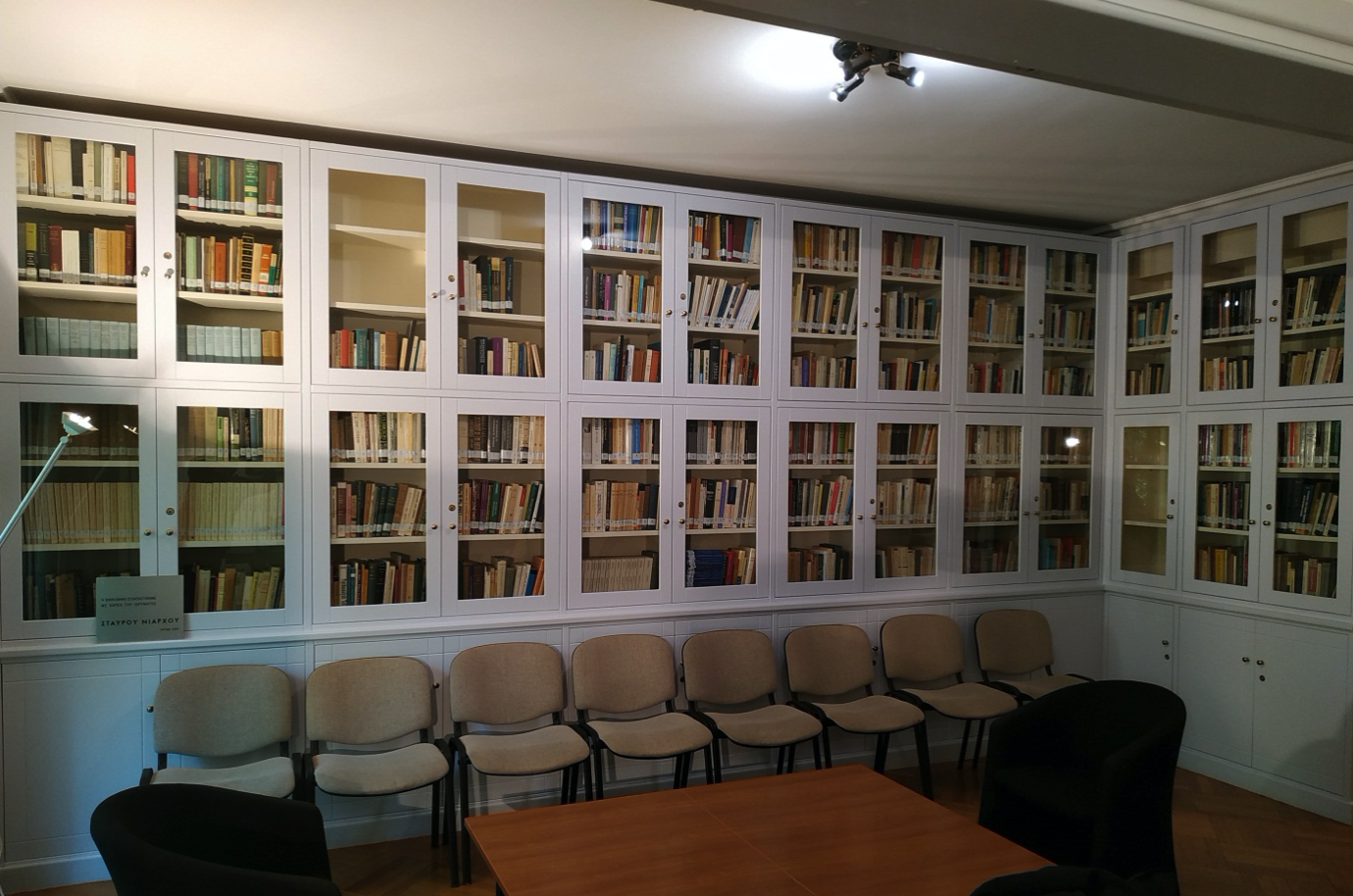
Hellenic Psychoanalytic Society
The story of psychoanalysis begins in 1915, with the publication of a paper “The beginning of language and Freudian psychology,” by linguist and educator M. Triantaphyllides. The intellectual community was interested at the time in psychoanalytic ideas, which were perceived as a “bourgeois” ideology.
In 1946, A. Empeirikos (a surrealist poet, analyzed by R. Laforgue), D. Kouretas (professor of psychiatry) and G. Zavitzianos (a child psychiatrist) began to attend seminars and supervisions held by Princess Marie Bonaparte, a Greek by marriage, at her Athens home. In 1949, Anna Freud gave a lecture at the Athens Medical School and launched the new IPA group. It lasted only a year. Anna Potamianou began to invite analysts from abroad to give seminars at the Community Mental Health Center which she founded in the 1950s. There were two more failed attempts (1967, 1974) to establish a study group with the help of S. Lebovici. During the 70s and 80s conditions became more favorable. Greece moved towards democracy and began to become an open society. Young clinicians trained abroad, searching for change, began to return to Greece.
The Hellenic Study Group composed of A. Alexandris (Canada), A. Potamianou (Paris), St. Beratis (New York), P. Hartocollis (Topeka -Menninger Clinic) and P. Sakellaropoulos (Paris), received a letter of recognition from the IPA on October11, 1982. The first Sponsoring Committee was composed of J. Sandler, J. de Saussure, S. Mentzos. In 1983 J. Sandler resigned, J. Chasseguet-Smirgel joined the committee, serving until 1991 when she was replaced by D. Pines. A.M. Sandler replaced J. de Saussure.
I think that the fact that the first founders of our Society and the Sponsoring committee consisted of analysts from different psychoanalytic cultures contributed to some real conflicts (regarding training) that founded our Society. Certain flight-fight behaviors were used as defenses against these conflicts. The result was that there was a delay in moving on to the next step.
In July 1997, our Study Group gained recognition as a Provisional Society at the 40th IPA Congress in Barcelona. New training analysts were appointed and in 2000 the Hellenic Psychoanalytic Society (HPS) became an IPA Component Society.
Psychoanalysis in the HPS is a work in progress. At this moment, December 2019, the Hellenic Society has one Honorary member, 48 members (19 of which are training analysts), and 13 corresponding members. It has 64 psychoanalysts-in-training, and 20 who have terminated their training but have not yet presented for qualification. The education committee has accepted 12 new candidates who will enter the training program after a year of analysis. A program on Child and Adolescent training, approved by the IPA, starts in January 2020. We value the autonomy of our training but I think we need to discuss various aspects of it with colleagues from other societies, when we invite them to visit and work with us.
We have been fortunate in having invited and worked with prestigious psychoanalytic colleagues from all over the world. In July 1984 the International Delphi Psychoanalytic Symposium was inaugurated. Held every four years, it is a gathering of psychoanalysts and scholars of the ancient Hellenic spirit. The next Delphi Symposium will be on August 20-26, 2020, on the theme of the “Xenos” (which cannot be precisely translated into English but means Stranger or Foreigner) (https://www.ipa.world/en/news_and_events/Event_Display.aspx?EventKey=EV20209&WebsiteKey=cc9ea1bf-cec9-47a2-a143-7f12f1b8b0b4).
The Hellenic Society organized the European Psychoanalytic Federation Training Analyst’s meeting, (October 2001); the 19th Annual European Psychoanalytic Federation meeting on Transformations (April 2006); and the 70th Congrès des Psychanalyse de Langue Française, whose theme was Entre psychè et soma (May 2010) in Athens, We have recently applied to host one of the next annual European Psychoanalytic Federation conferences (2022, or 2023).
The Hellenic Society holds its annual Conference at the end of November. This conference serves partly as an outreach function, as it welcomes university students and other mental health professionals. Moreover, every year at the beginning of May, the Hellenic Society organizes its annual symposium only for members and analysts-in- training. In-house scientific meetings for members and analysts-in-training are held once a month. Our corresponding members also contribute to the scientific life of the Society.
Training is the main reason that we have a Society. However we recognize that transmission of psychoanalysis continues after termination of training. The climate of a Society plays an important role in the process of transmission. It is the responsibility of every psychoanalyst. We have a number of creative ad hoc “working groups” organized by members and psychoanalysts in training on deepening their thinking in a subject of their interest.
Our Society’s prestige is recognized by the community. In order to live and prosper a psychoanalytic society needs a facilitating environment, an atmosphere with a ‘temperate’ climate. A facilitating environment is created when we work with our “neighbors’ so that the concepts of psychoanalysis meet with the concepts of the community in a way that is convincing and remains relevant to our lives today. This natural environment of our Society is within a climate made of conscious and unconscious currents linking psychoanalysis with the broader community: psychiatry, psychology, neurobiology, literature, theater, cinema, the media, and the universities. It is important to maintain the specificity of psychoanalysis as well as the autonomy of our Society. It is also important to keep in mind our links with the “couple” of our origin (science and culture).
In order to cultivate a favorable climate, our Society organizes outreach activities. Our members and psychoanalysts in training serve in various committees in which they offer generously effort and imagination to the life of the Society:
- Every year we offer a course of introductory lectures for mental health professionals, held in the Society’s office.
- We organize a course including introductory lectures and group supervision for residents in psychiatry and psychology in the psychiatric clinic of the National Air Force General Hospital.
- The Society’s website (http://www.psychoanalysis.gr/ and https://el-gr.facebook.com/psychoanalysis.gr) is an important tool of communication inside and outside the Society.
- Every year, we organize six evenings of Cinema with Freud (https://www.psychoanalysis.gr/index.php/cinema) in which a film is shown followed by a discussion with a psychoanalyst, an actor or director and the audience about the internal and external scenes of reality that are depicted in the film.
- A committee has undertaken a program of action research and support on Catastrophes and the Refugee crisis (supervision and lectures for front line workers).
- A committee offers assessment and referral for low-cost psychoanalysis.
- Every year we are invited to hold a panel at the annual conferences of Psychiatric and Child Psychiatric Associations.
- We participate in joint conferences with Psychotherapy Societies, Universities, and mental health centers.
- Occasions evening meetings with artists (literature writers, poets, etc) are enjoyed very much. We have also held meetings between psychoanalysts and scholars from other fields (history, politics).
- A committee has undertaken the publication of our Society’s monographs (of works presented at our scientific meetings),
A library (one of the two most complete collections of psychoanalytic books and journals in Greece) is open to us.

Apart for the committees, individual members and psychoanalysts in training of HPS are active “off the couch” in many useful ways. For example:
They are faculty members in three University psychology departments. They are directors of four departments of adult, child and adolescent psychiatry. They supervise clinicians working in community mental health centers (very meaningful activity during the last years of economic crisis in Greece). They teach and supervise residents in psychiatry and interns in psychology. They supervise and analyze trainees at psychotherapy institutes. They organize scientific meetings on psychosomatics. They teach a course in an adolescent psychiatric center. They hold teachers’ and parents’ seminars. They hold workshops for pregnant women and mothers of babies. They translate, edit, and publish books on psychoanalysis (the last 20 years psychoanalytic publications have bloomed in Greece). They publish “Oedipus”, a Greek psychoanalytic periodical. They publish the Greek version of the Annual of IJP. They give radio, television and newspaper interviews, and run their own face book pages. They organize a “Freud café” in which a psychoanalyst and a person from literature and arts discuss topics of broader cultural interest in a down town Café.
When we have founded a Psychoanalytic Society we abstract and claim a specific space from within the wider community. The integration of the Society bears certain marks of trauma at its boundaries. We, like Prometheus, abstract a piece of unknowable reality and transfer it, like the fire, in a capsule. Then, we enter a painful process of internalization. After Prometheus was released, Zeus ordered him to wear a ring that was made of the steel of his chains and a small piece of the rock on which he was tied. The ring of mutual recognition and belonging to the same Society keeps in its core a non-elaborated “rock” of historical truth that always escapes elaboration.
However, we struggle to maintain an ethical public space that allows this` tragic sense and recognition of otherness.
In participating in the institutional and training life of our Society we ask ourselves: In the broader world of psychoanalysis why are HPS and IPA relevant today?
Sotiris Manolopoulos
Athens, December, 2019